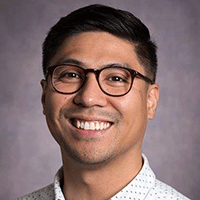
Thursday, November 21, 9:00am-9:45am
Salvador Orara, MFA
Willamette University
Presenting in Track 9: Engineering Education
Presentation Title: Complex, Uncertain, Volatile, and Ambiguous: Why Engineering Programs Should Consider Integrating Humane-Centered Design into Their Curriculum
Abstract: In an era characterized as volatile, uncertain, complex, and ambiguous (VUCA), the imperative to incorporate design thinking and humane-centered design (HCD) into engineering programs becomes evident. As traditionally structured, engineering education often falls short of preparing students to navigate the intricate and unpredictable challenges of the contemporary world. Acknowledging the VUCA context underscores the inadequacies of conventional approaches that prioritize technical skills at the expense of a holistic understanding of real-world problems, the systems these problems reside, and the human and non-human stakeholders impacted by them. Humane-centered design has emerged as a transformative framework. By placing the experience or all living things at the core of problem-solving, HCD introduces a nuanced perspective that extends beyond technical proficiency. It encourages empathy, collaboration, and a deep understanding of the diverse needs and contexts of everyone and everything. This approach not only equips engineers with the ability to address complex problems but also ensures that solutions resonate with the intended beneficiaries and the expanding intricacies of the complex ecosystems they engender. Embracing humane-centered design is not just an enhancement but a necessity for engineering programs aiming to produce graduates capable of thriving in a world characterized by constant change and unpredictability. The synthesis of these elements — the recognition of VUCA, the critique of conventional engineering education, and the advocacy for HCD — shapes a compelling narrative urging a holistic transformation in how engineers are educated. The speaker will share their experiences conceiving and implementing an academic minor on innovation through humane-centered design, critical making, and design ethnography. This initiative took place within the context of a Catholic liberal arts institution, serving interdisciplinary cohorts that spanned engineering, business, nursing, education, and the liberal arts. The presentation will be driven by critiques that frame nursing, engineering, and entrepreneurship case studies.
Biography: Salvador Orara is a designer, educator, and creative technologist who recently served as the Innovation Professor of Practice and Director of Innovation Programs at the University of Portland. Prior to joining UP, he was the Lead User Experience Strategist and Product Owner at Jaguar Land Rover. His 20+ year career boasts experiences as a contractor, consultant, researcher, academic, and entrepreneur. He specializes in design studies, exploring the impact of design-centered frameworks within teams and organizations and the instigation of change within industry contexts and academic curricula. In the academic domain, his work has shaped programs at Woodbury University, Art Center College of Design, Pacific Northwest College of Art, and the University of Portland. Salvador received his Master’s in Fine Art in Media Design Practices from Art Center College of Design in Pasadena, CA., and a Bachelor's in Fine Art in Graphic Design from the University of the Arts in Philadelphia, PA. He was President of the AIGA Portland Chapter and founder of The Rare Studio. His work has been published by Routledge, the Western Institute of Nursing, and IEEE. His current research focuses on design studies within liberal arts programs, the impact of futuring and foresight methods on first-generation students, and developing tools and design-centered frameworks for problem-solving within non-design curricula such as nursing, entrepreneurship, and engineering.